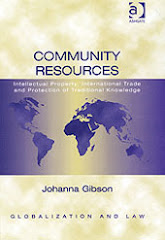
A communication (see WTO Documents, 31 May 2006), at the request of India and also on behalf of Brazil, Pakistan, Peru, Thailand and Tanzania, has been circulated to the WTO General Council and Trade Negotiations Committee, ahead of the June meeting of the WTO TRIPS Council. The Communication refers to discussions that have, to date, developed towards reform of patent law so as to introduce a mandatory requirement for the disclosure of origin of biological resources and traditional knowledge. This requirement would form a part of the procedure towards a grant of patent rights in an invention, based upon such resources.
This communication follows an earlier document, circulated at the request of Bolivia, Cuba, Ecuador, India, Sri Lanka and Thailand for the March 2006 meeting, in which revocation of patent rights was advocated where origin of materials was not adequately disclosed: "The disclosure of source and country of origin are critical tools in the determination of novelty and inventiveness." At the same time, the United States circulated a communication arguing against such disclosure requirements. In that document, the United States shifted the responsibility away from the TRIPS Agreement and what it described as "burdensome remedies" (in the form of possible reform), and placed that responsibility onto individual members and "the lack of clearly defined national systems." However, developing countries and indigenous groups have continued to advocate an international basis for such obligations (as for other obligations under international patent systems) as the only way to ensure cross-border enforcement in the context of otherwise disproportionately imbalanced contractual relationships.
This week's communication refers to the commitment to outstanding implementation issues, as part of the Doha Ministerial Declaration, and states that the relationship between the TRIPS Agreement and the Convention on Biological Diversity (CBD) remains an outstanding issue. In particular, Art 27.3(b) deals with optional exclusions from patentability (at the discretion of member states), "plants and animals other than micro-organisms, and essentially biological processes for the production of plants or animals other than non-biological and microbiological processes." Art 27.3(b) goes on to provide that members must protect plant varieties "either by patents or by an effective sui generis system or by any combination thereof." Importantly, built into Art 27.3(b) is an obligation to review the provision four years after the date of entry into force of the TRIPS Agreement. To date, many have lamented the torpor of this review process.
The Communication presents a draft Art 29bis, for insertion into the TRIPS Agreement. Following Art 29bis, Disclosure of Origin of Biological Resrouces and/or Associated Traditional Knowledge, where the subject matter of a patent application has derived from or been developed with biological resources and/or associated traditional knowledge, disclosure of the country of origin of biological resources and traditional knowledge would be required as a condition of patentability. This would be in addition to compliance with the national requirements for access and benefit sharing, including prior informed consent and fair and equitable terms.
In interview with IP-Watch, a Thai official described as "sad" the fact that developing countries had to negotiate such a provision 10 years after the negotiation of the TRIPS Agreement, and that it was "unfortunate" that this had not taken place during the Uruguay Round.



No comments:
Post a Comment